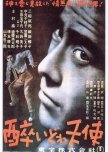
The angel of this movie, Dr. Sanada, is an ill-tempered alcoholic, as scruffy as he is cantankerous. Shimura Takashi gives a wonderful and unsympathetic performance as a doctor with little patience and even less tact. Though disheveled and always with a level of alcohol in his system he is a compassionate and skilled doctor. As he informs Matsunaga, the local gangster who comes to him for help, angels don’t look like beautiful dance hall girls, they look like him. Sanada not only tries to save Matsunaga’s life, but also his soul from being completely stamped out by the violent life he leads.
Matsunaga is torn between doing what must be done to live and the immorally squalid life where he is a big fish in a typhoid infested pond. Like Sanada, he has a terrible temper as well. Mifune Toshiro brings out all of the fear and frustration built up in this brutish character.
Unlike many yakuza or gangster movies, the criminals are not glamourized. Doctor Sanada speaks for those who live under the yakuza’s rule when he tells Matsunaga, the yakuza code of honor is a façade and merely self-serving. He compares it to the feudal system and declares it obsolete.
Sad guitar music often plays in the background setting the mood. Further setting the mood is the pool of filth where children play, foretelling their future in the crime ridden part of town.
The two damaged alpha males are fascinating to watch as they butt heads. A powder keg of fear and violence is set off when the deadly and treacherous Okada is let out of prison and has his sights set on Matsunaga’s job and girlfriend and Sanada’s female assistant.
This is a powerful movie about two opposing forces at work for the souls of the people, the hedonistic and violent yakuza on one side and the life ruled by reason and compassion on the doctor’s side of the disease infested swamp. It would take a “dirty, drunken angel” to reside in such a place and an angel tough enough to fight for the hard-won wins and suffer the heartbreaking losses. Drunken Angel is an emotional ride, but one worth seeking out and trying.
Considerați utilă această recenzie?
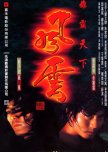
The Storm Riders
3 oamenii au considerat această recenzie utilă
Sonny Chiba plays the perfect Big Bad. He has the evil laugh down to an art form. Ekin Cheng as the kindhearted Wind and Aaron Kwok as the unpredictable Cloud make for an interesting pair of men raised as brothers by the man who killed their fathers. Kristy Yeung and Shu Qi are there more for adornments and a little lusty conflict and humor respectively, but not particularly integral to the story. Of course, the movie hits its stride when Cloud and Wind must combine forces into a storm to try and take down Lord Conqueror and avenge their families while also freeing themselves and the world from his tyranny.
There's a fiery monster, a fighting monk, destiny, magical glowing red fruit and an arm seeking it's master. The movie rarely slows down to let the viewer catch their breath. The special effects were very good, but at times over-powered the fight scenes. I would liked to have seen a few more actual martial arts moves during the fights.
I tend to struggle with movies based on comics as often the movie makers assume the viewer is completely familiar with the story and they tend to skip about or not flesh out the main characters, but this story was told in a comprehensible straight forward manner and granted the main characters enough story development for me to care about them. The Storm Riders was a fun, entertaining movie.
Considerați utilă această recenzie?
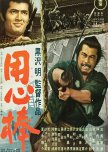
Despite his unkempt appearance, Mifune Toshiro saunters into town with a posture like an old-time gunfighter ready for a fight. In this town gambling, lying, cheating, and murder reign supreme. Prostitutes and townsfolk peer out of windows watching the play unfolding before them. The people are dirty and you can practically smell them in the desolate landscape. Western heroes before this were squeaky clean, but this ronin is roughly dressed and seems to scratch at fleas in his hair. I kept expecting to see a tumbleweed skitter across the dirt road in front of him.
Mifune Toshiro’s subtle and fluid body language and ever-changing facial expressions conveyed more than 10 pages of dialogue could about his character. He is the coolest ronin ever. Masterless, broke, and hungry he strolls into town taking inventory. While he has compassion on the townsfolk oppressed by two vicious rival gangs vying for control, he also needs to make some money. He has no problem doing what needs to be done to turn the gangs against each other and pocketing a few coins. This is not the cowboy with a white hat who adheres to an unbudging ethical code, this ronin toys with his prey before ultimately killing it. Sanjuro (the name the character chooses at random) is a classic anti-hero and fascinating to watch.
There is humor interspersed among the mayhem. One of my favorite scenes is after Sanjuro had stirred up trouble between the gangs, he climbed to a high point to gleefully watch the confrontation.
I’m no film student, but my amateur eye can pick up on the skill that went into the cinematography of this film. Every shot and frame felt filmed with care and an eye toward what was necessary for the story to be told.
The music varied from ominous to playful with some kooky 1960’s horns and cymbals thrown in for good measure.
Yojimbo is not a non-stop action film, though there are a few good action scenes in it. Sanjuro is as deft with his strategy as he is with his sword which is fun to watch as he pits people against each other. Yojimbo is a classic for a reason and well worth trying. I found it highly entertaining.
29 June 2021
Considerați utilă această recenzie?
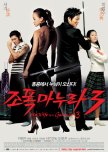
My Wife Is A Gangster 3
3 oamenii au considerat această recenzie utilă
When Aryoung has to lay low in Korea with a bunch of goofball gangsters, the gangster farce begins. I actually enjoyed most of the comedy, especially the translator's liberal and less than literal translations. The five disparate characters bonded quickly into their own familial gang.
Shu Qi's deadly, fearless, and taciturn character played well off the three stooges of crime. I'm always pleased when the female lead isn't a damsel in distress. In this case, she played the rescuing or avenging hero more often than not and she was glorious when she was fighting.
This is one of those strange mash-ups of straightforward crime story and ridiculous crime comedy. For the most part it worked for me. Shu Qi can conjure up chemistry with just about anyone but I never bought the romance between her and the mullet-headed and not too bright leader of the Stooges, and would have been happy if they had not introduced a romance between them. Other than the forced romance and some of the over the top slap stick comedy I enjoyed this strange amalgam of Hong Kong and Korean movie.
Considerați utilă această recenzie?
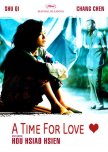
A Time for Love, is set in 1966. Shu Qi plays a young woman who works in a pool/snooker hall where she meets Chang Chen's character who is about to join the military. The Platters' Smoke Gets In Your Eyes plays in the background. The colors are warm and gauzy with a strong use of green. And these two are young, green and tentative as they give each other shy glances across the table. There is very little dialogue in this vignette, the tale told through actions, and body language. They write to each other after he leaves for the military and we see her smile as she reads his letter. Innocent and full of hope, this was easily my favorite story. "They asked me how I knew, My true love was true, I of course replied, Something here inside, cannot be denied." (Smoke Gets in Your Eyes)
A Time for Freedom is set in 1911 during the Japanese occupation of Taiwan. Shu Qi works in an upscale brothel and Chang Chen is her long time customer who comes and lives there when he is in town. Here the lighting is as subdued as the acting. The restraint is only broken when Shu Qi's character sings her sad songs. There are no spoken words in this vignette, though it is obvious much dialogue is being spoken, only a few words are shown on placards for the audience to read like in the old silent movies. I felt for Shu Qi's character, trapped in what amounted to indentured servitude with her only hope of someone making her his concubine. Chang Chen's character didn't approve of taking a concubine, but apparently staying at a brothel with girls as young as ten wasn't a problem with his ethics. Here again, there isn't much spoken conversation with some letters providing the rest. This story was sad and filled with longing as the couple and their world suffered. "Although this place has torn my heart, it is wrenching to leave it." (Liang)
A Time for Youth is set in 2005. The colors are harsh-cold grays and icy blues. Life is chaotic, fast, and real communication even with cell phones, email, and blogs is shown as being more difficult than in the past. Shu Qi plays a woman in a lesbian relationship having an affair with Chang Chen's character. He has a girlfriend who knows something is going on, just as Shu Qi's lover does. The two border on obsession as they meet in secret, creating tumult in their wake. "No past, no future, just a greedy present." (Jing)
The characters are molded by the times they live in, each one feeling authentic. Shu Qi gave brilliant performances. Her characters required a greater emotional breadth than Chang Chen's did and she absolutely nailed them. It's no wonder she won a Golden Horse for Best Actress for her work in this film.
This movie is not for everyone. It is slow and subtle, the endings not clearly written out, the characters not always likeable. If you don't mind the aforementioned you might be in for a quiet, gem of a movie.
Considerați utilă această recenzie?

Godzilla X Mechagodzilla
2 oamenii au considerat această recenzie utilă
Această recenzie poate conține spoilere
This is one of the Millennium films and it's not bad. The film did start off on the wrong foot with me by declaring Mothra a bad guy. If they got on the bad side of Mothra they had to have either been messing with her tiny twin besties or trampling the environment, but I digress.I was impressed with the FL, Yashiro Akane. Women are often prominently featured in Godzilla movies, this time they got it right. Even though the failure of not defeating a new Godzilla with her weapon and being unable to control her vehicle leading to another vehicle getting crushed under Big G's feet were laid squarely at hers she was able to redeem herself. She was strong, smart and no damsel in distress or screamer as is usually required of women in monster movies. A welcome relief. Ultimately, she was put in charge of controlling Mechagodzilla in the fight when Godzilla returned.
Kiryu, the mechanized Godzilla, built on the 1954 Godzilla's skeleton unfortunately had some DNA memory of the destroyer unknowingly coded within it. I wasn't sure or not if this was a deliberate message that building bigger weapons of mass destruction can be as dangerous as the foe before you.
The humans in this movie were the best of any I've watched. However, the training sessions went on too long for me. I watch Godzilla movies for the monsters, not the people. The star of the show was missing for huge chunks of time as if they'd forgotten about him. Long, loving shots of the mechanized Godzilla and the soldiers' training sessions could not replace him. When he finally showed up the fights were good, but lacking in energy and urgency. It's a perfectly fine way to spend 90 minutes on a lazy Saturday afternoon, but it could have been so much better.
Considerați utilă această recenzie?

Miracle in Kasama
2 oamenii au considerat această recenzie utilă
The acting in this film was natural if a bit stiff at times, but the actors were able to convey their characters' discomfort of adjusting to each other, accepting each other, and then revealing their truths. The music fit the emotions, though at times it felt unpolished. The cinematography was appropriate for the small, almost play-like atmosphere, no beautiful grand shots.
The chestnut in it spiny bur becomes a metaphor for the protections we put around the most sensitive parts of ourselves. Each of the three characters work to peel those layers back to confront the precious secret inside of themselves.
A short, spare, film big on heart.
Considerați utilă această recenzie?
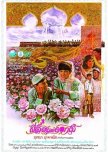
Peesua Lae Dokmai
2 oamenii au considerat această recenzie utilă
Această recenzie poate conține spoilere
Butterfly and Flowers is a heartwarming coming of age story. Huyan is a young Muslim teen struggling with poverty. His mother died and his father is a laborer. He’s an excellent student and popular with the other students. When his father chooses to pay for a school fee instead of buying rice for the family Huyan decides to drop out of school. Selling popsicles on the street he hopes to earn enough money to send his siblings to school. When an accident pushes the impoverished family closer to the edge he feels he has no other choice than to go to work for the rice smugglers so that they can survive. The question he keeps asking of himself is, “what does it take to be a good person?” The young rice smugglers hide bags of rice on trains and try to avoid the conductor checking for tickets by riding on the top of the trains. The work is dangerous and the risk of getting hurt or arrested looms over the boys every day. Far from being a gloomy story, Huyan makes friends and provides for his family. A sweet romance develops between him and Minpee, a girl he knew from school who loves flowers and butterflies.
Huyan will ultimately have to make decisions for his family’s future and his future with Minpee. Whether those decisions will lead to him being a good person of course is always the question.
The acting in this movie is very natural. I was quickly drawn into Huyan’s life and desire to take care of his family. There are no villains, only people trying to feed themselves and their families. Much of the action and conversations take place on trains. Are they moving toward something better or something worse?
Huyan’s goal for himself is familiar to many people---how to be a good person? “It’s tricky.”
Considerați utilă această recenzie?
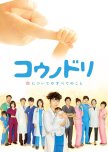
Dr Storks protect and assist the miracles
Dr Storks followed the trials, joys, and frustrations of the medical personnel in the labor and delivery portion of a hospital as well as those in the NICU. Dr. Konotori worked to help mothers share the gift of life during the miracle of birth. Pregnancy is not an illness but as the drama showed, it is not without risks. The doctors and midwives fought alongside the parents and newborn infants as they dug deep to find their courage to succeed and survive.The main OB/Gyns were Drs. Konotori and Shinomiya, both devoted to their patients but as different as night and day. Friendly and talkative Konotori was willing to risk a mother’s life to save her uterus while harsh speaking and quiet Dr. Shinomiya was ready to perform a hysterectomy at the drop of a hat. Made for an interesting balance. For anyone wanting to watch the drama for Hoshino Gen, he was only in each episode for a few minutes. This was Ayano Go’s starring role and he made the most of it. I thoroughly enjoyed his piano performances in disguise as the pianist "Baby". Some doctors had character growth and others broke down. In my country the majority of OB/Gyns are women so it was odd seeing the majority of doctors as male. The female doctors weren’t very well represented. One female doctor was easily excitable and distracted while the other was a walking burnout. Both came across as fragile. The doctor I would want in my corner was the older NICU doc. He saw the big picture and was steady emotionally.
Each episode had different medical crises and subjects---teen pregnancy, adoption, abortion, Rubella, birth defects, maternal and infant deaths, IVF, smoking, preservation of the uterus, midwives, pregnancy and sexual discrimination, as well as discrimination against single parents and working women with children, postpartum depression, and more—whew! A few of the topics came across as strange to me. Adoption seemed to be a new concept and there were misconceptions about the availability of pregnancy care in Hawaii. Members of the staff also had very callous attitudes toward certain patients which seemed the opposite of how they should have approached patient care. The gut-wrenching stories involved parents and spouses faced with traumatic decisions that no one would ever want to make. Some parents handled bad news better than others. As in real life, there were parents who would do whatever was needed for their baby and others who wouldn’t visit a child fighting for its life. A few of the topics were handled with the subtlety of an afternoon school special while others were quite well done. I hate to admit that I became teary during two or three of the stories. It wasn't all tears, there were lovely heartwarming stories as well.
The cinematography and lighting were rudimentary and could be distracting. At times the music blared over the dialogue which was also distracting. What Dr. Storks had going for it were the compelling stories of life, death, and the medical personnel who fought for happy healthy outcomes for everyone even when it wasn’t possible. The doctors realized they were often powerless and that “things don’t always go as planned,” but that didn’t stop them from giving their all to the women and tiny lives entrusted to them.
4 Jan 2024
Considerați utilă această recenzie?

Această recenzie poate conține spoilere
"Pleased to eat you!"
If you decide to watch The Meg because of the tagline, "Pleased to eat you!" you probably already know to check your brain at the door because you are about to be swamped with clichéd characters and plot and ridiculous pseudo-science. Most of the CGI and cinematography were quality which helped when the dialogue tried to drown the fun of a massive Megalodon or two set loose from the Mariana Trench!Starring Jason Statham, you know he's going to have to go mano y pectoral fin with the giant 90ft/27m shark at some point in time. Jonas is the lone diver who can attempt a rescue at over 11,000ft/3300m depth and he's off in Thailand drinking his sorrows away. He'd attempted a rescue five years earlier of a sub trapped in the Trench and had to abandon some of his men when the sub was attacked by a giant creature. Even though he saved numerous lives he was branded as having had a psychological breakdown for the story he told. When his ex-wife and crew become stranded at the bottom of the Trench, an old teammate comes calling to talk him into rescuing her.
The characters were stock characters, shallow with little personality. Li Bing Bing was weighed down in the Stereotypical Headstrong Female Scientist role who thought Statham's Jonas was crazy and treated him as such until she was rescued by him numerous times as he snatched her out of the jaws of death. She had a Wise Beyond Her Years Daughter who helped to lead the two divorced people to a romance. The rest of the crew included the Egotistical Billionaire, Tough Chick, Black Guy Who Can't Swim (really?!?), Scientist Bestie, Jerk Doctor, Dad With a Target On His Back, and a couple of other scientists. Honestly, with the exception of a couple of characters, none of them were developed enough to make me care whether they lived or became chum. One of the early deaths was actually emotional and done well, after that it was bring on the shark!
The science was particularly awful without any conception of the forces at work on submersibles and the people in them at the deepest depths of the ocean. And one scene that was supposed to be frightening had me laughing until I could barely breathe. Seriously, that little boat they used was tough if they could lasso a megalodon using it! Also, every time the script called for Statham to have to dive into the water to face the big fish to show his courage was hilarious.
If you watch this movie, you need to know that there aren't any award-winning performances, in fact, some are particularly bad. The science is dreadful. The dialogue can be cringe-worthy. When numerous people are threatened the stakes don't feel very high because we don't know anyone, even the people from the main crew who fall into the water every five minutes. If you can set all that aside, it is a fun movie with the ginormous sharks seeking to turn back the clock about 10 million years when they ruled the oceans.
9/13/23
Edit--I bumped the score up .5 because I enjoyed it more than the sequel although the sequel had better acting. This one had me laughing more.
Considerați utilă această recenzie?
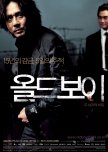
Această recenzie poate conține spoilere
"Even though I'm no better than a beast, don't I deserve the right to live?"
Oldboy was an unflinching violent revenge film that would have made a Greek tragedy blush. I watched this film during its 20th anniversary year and the production values held up. The storytelling's misogynistic overtones dated it and didn't hold up as well. I've not mentioned any of the major plot twists in this review.Choi Min Shik as the deeply flawed Oh Dae Soo did a marvelous job transitioning from drunk, philandering husband to confused, bitter prisoner to vengeful vigilante searching for answers. Yoo Ji Tae made a decidedly creepy and vengeful Lee Woo Jin. The two men whose lives were intertwined by a careless comment were at their best when playing cat and mouse.
The action scenes showed that nearly anything can be transformed into a weapon. You may never see toothbrushes the same. A hallway fight leading to an elevator fight were truly iconic and I can see where they influenced many other fight scenes in television and film. Dae Soo's commitment verging on insanity was frighteningly powerful.
Where the film failed me were the women's roles. Their very existence seemed to be as vessels of the men's lust and "love". They played into the men's circle of vengeance with no real identities. Of course, they were necessary to have several gratuitous bare breast shots and being threatened with sexual violence. Mi Do accepted it as perfectly normal when Dae Soo attempted to rape her. And the final plot twist, sick as it was, once again left her without any choice or agency of her own.
While Woo Jin's revenge long game was vile, the film seemed determined to make Dae Soo as unsympathetic as possible from beginning to end. His one moment of empathy was cut short by self-gratification. In the end the film doubled-down on his troubling personality. There was no redemption arc, no moment of healing, no positive character growth, only primal animal instincts. As a thought exercise in tearing away the veneer of civilization, the film succeeded in a disturbing manner.
9/2/23
Considerați utilă această recenzie?
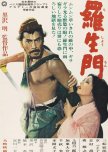
Această recenzie poate conține spoilere
"It's human to lie. Most of the time we can't even be honest with ourselves."
*I have updated this review and my score on a second viewing. My added thoughts follow the original review.*I'm going to post a short, heretical review of this much lauded film. Much as I wanted to love this film, it had a major stumbling block for me in the story.
That the movie is technically well made is not up for debate. It was a well made movie from 1950. I've enjoyed other Kurasawa movies. I love Mifune Toshiro. Rashomon might have been a profound movie experience for me if the story had not been told through such a narrow male lens.
The Rashomon effect is still used to describe eye witnesses giving different testimony to a single event. People do lie to each other, to the court, and to themselves because of their egos, fears, survival instincts, and inability to face the truth. The film showed this human frailty quite poignantly. The cinematography, music, and acting were exceptional for the time. Mifune's performance as the bandit tinged with madness was unexpected but quite well done although at times it did veer into Ernest T. Bass territory.
Where I diverge from the fans of this movie is in one particular aspect of the film. It repeatedly showed and told the viewer that women were not just physically, but morally weaker than men and were not to be trusted. This was even more despicable because the men were shown as being morally corrupt so the raped woman was even lower than they were. Twice we come away with the woman in the story enjoying her rape and trying to use it to her advantage. In different flashbacks she pit the two men against each other or asked the bandit to murder her husband. That she was willing to go with her rapist was beyond comprehension to me, unless she was planning on murdering him in his sleep. I understand that during the period of time the movie was set in, and even in 1950, a raped woman was looked on as damaged goods. (The Comfort Women after WWII were looked down upon and expected to commit suicide and often shunned by their families.) If the director had convinced me that she was doing what she had to do to survive I might have been able to stomach that part of the story better, but as it was shown it built a fire of anger in my chest, not at the woman but the storyteller for perpetuating some of the most dangerous myths about women and rape. Given, it was a common view of the time, but it didn't make it any less reprehensible to me.
Only in the woman's version does she not come across as a conniving "whore", perhaps only a murderous woman to save herself, but we are also told to not believe a woman's story immediately thereafter.
As much as I tried to overlook the misogynistic view of women and rape in this movie to enjoy the rest of the story, I couldn't escape it. Rashomon, despite all the glorious reviews I've read across the internet, failed to live up to them in my experience.
2 September 2021
*Update on my review:*
Having now watched all but one of Kurosawa’s films for which he was the writer/director I decided to revisit this film about the unreliability of eye witness accounts and how truth is often relative, enigmatic, and subjective. I struggled with it mightily the first time because of how women were not only looked down upon but treated with outright hostility. I wanted to see if my opinion would change on a second viewing of this famous and well-loved film.
When asked about Rashomon, Kurosawa had the following comments: “Human beings are unable to be honest with themselves without embellishing…(these characters) are the kind who cannot survive without lies to make them feel they are better people than they really are.” “The human heart is impossible to understand.”
The message that people are weak and even lie to themselves for a variety of reasons still resonates. Also, how perspective and memory are faulty witnesses still holds true. I would have to add that perhaps Kurosawa was blind to the depths of his own gender bias. Other Japanese directors from this time frame and even earlier had made films showing how the patriarchal society caused women to suffer, I guess I was just expecting more from one of my favorite directors. I’ve read interviews with him about this film and he discussed at length how they suffered from leeches while filming in the forest, but not even a brief comment about the trauma or suffering rape causes a woman or how he wanted to show the inequality women suffer from. Instead Tajomaru is romantically described as a womanizer.
Social reform, individual responsibility, and equality were important points in many of Kurosawa’s films. Apparently, just for men. Masago’s rape was only viewed as a crime against her husband, and yes, I know this would be historically accurate. I was just looking for a hint of sympathy for her from any of the male characters since she was the only woman in the film. Her testimony in court was dismissed as irrelevant immediately. When she testified, she didn’t even mention her rape because either she knew no one would care or the writers knew that. The only crime was the samurai's death. The male rape fantasy that women really like it and want to be dominated was still appalling. Just one flicker of disgust from the men telling the story to the peasant, anything to tip the hand that her treatment was inexcusable, but nothing. Because all of the voices except one telling the story or judging it were male—the witnesses, the judge, the writers, the director---Masago’s witness was all but ignored. Masago's only weapon against the dominating men was her sexuality, all she had to try and salvage her situation with and save her life. Perhaps Masago was diabolically cruel and cunning, pitting two men’s penises and swords against each other for her own pleasure, her rapist and heartless, cowardly husband, but as was pointed out, “It’s human to lie. Most of the time we can’t even be honest with ourselves,” so I’m afraid I can’t even believe the actor (character) who usually played the moral compass in Kurosawa’s films.
I did bump my score up from a 6.5 to a 7.5 because this is a culturally important film and it was well made, but honestly, and still unpopularly, I didn’t like it any better the second time around. From my own biased witness on this film, if Kurosawa had been making a culturally relevant film that also purposefully highlighted the ruthless way rape victims were treated and the stunning disregard for women instead of reinforcing dangerous beliefs, I’d have rated this much, much higher.
11 June 2024
Considerați utilă această recenzie?

Godzilla: Final Wars
3 oamenii au considerat această recenzie utilă
This was almost non-stop Kaiju battles as monsters from the previous 50 years showed up to do battle with Godzilla, including the abomination from the US Godzilla (1998). A who’s who of monsters from the Godzillaverse---Hedorah, Rodan, Kamacuras, King Ghidorah, Manda, the aforementioned Zilla and many others. Mothra even showed up to bat clean-up with Gigan.
There was a lot to love in this movie. The humans were the most interesting of any of the Godzilla movies I’ve watched. It had aliens and mutant humans and futuristic weapons. Kitamura Kazuki as a bad alien with even badder guyliner was over the top. He looked like he was having as much fun making the movie as I had watching it. Don’t expect Oscar worthy performances, it’s not that kind of movie.
How could I not love a Godzilla movie that included my second favorite niche genre-kung fu in it?
Yes, the story could be a bit of a mess, but was easy to follow. The director unashamedly included a lot of the science fiction fads from previous years, the Matrix, Star Wars, Independence Day, Alien, and Jules Verne, among others. Sometimes it worked, sometimes it didn’t. No doubt there were moments of pure cheese. They also must have spent most of their money on the monsters, sets, and CGI because the music sounded like some guy hitting random notes on a synthesizer. The non-stop action from beginning to end could be draining and there were times when Godzilla was absent during a lot of the action with other monsters and the aliens. However, when Godzilla did appear, he showed why he was a force to be reckoned with.
Godzilla: Final Wars features guys in rubber suits and miniaturized cities and vehicles, just as the Godzilla Genie intended them to be from this era. On Godzilla’s 50th anniversary and retirement, it was appropriate. Final Wars was a monster mash that was fun and entertaining from beginning to end.
Considerați utilă această recenzie?
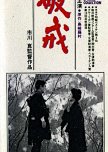
"My ammunition is my speech"
Apostasy was a muddled criticism of the caste system in Japan set in the early 1900’s. I learned some new things about the feudal system and their utter disregard for the burakumin. The burakumin were social outcasts due to their jobs that related to uncleanliness and death. Fascinating how eating butchered meat is okay, butchering the meat makes you less than. Everyone wants their dearly departed loved ones taken care of, but undertakers were less than. Segawa was a young teacher who came from the burakumin caste who was sworn to silence by his father so that he could live a normal life.Kazama, an older teacher from the samurai caste is forced to resign months before he could retire and collect his pension. Young progressive teachers Segawa and Tsuchiya attempt to argue his case with the principal but are promptly shut down. The principal’s “modern” nephew is hired to take Kazama’s place. Inoko, a burakumin who has come out and is leading the charge for equal rights for outcasts is constantly threatened. He is looking for a successor and hopes Segawa will take his place. Segawa is in love with Kazama’s daughter Oshiho, but afraid to push forward as she is from a higher class and he is secretly an outcast and terrified of being found out.
In older Japanese films, it is usually a solid rule of thumb that the good guys/girls are dressed in traditional clothes, while the bad guys/girls are dressed in Western style clothes. While Segawa and Tsuchiya were progressive in their ideas, they wore traditional clothes. The principal and immoral nephew wore suits. The lower middle class that had taken over the school board in this time of change drove out the samurai for financial reasons. They were just following “the rules.” The once ruling class was initially shown sympathetically. Yet those whose standings were raised were oppressively prejudiced against the outcasts and unwilling for them to have the same chances opened up to themselves. It was the same game, just different players with the marginalized still suffering the most. The outcasts were refused medical care and told they were not welcome even in small backwater towns. When one burakumin was murdered it wasn’t seen as a crime. The film also alluded that it would be these new people stepping into the power structure that would support the militaristic ideas that led to WWII. And of course, this film was largely dealing with men’s ability to have access to better opportunities. If Oshiho had told Segawa she wanted to train to be a doctor, he’d have thought she was out of her damn mind.
Segawa should have been the focal point of sympathy but he behaved so emotionally and at times cowardly that it was hard to relate to him. He was surely torn between his father’s mandate to keep his heritage secret and his mentor’s mandate that only by stepping into the light and demanding equality could the outcasts ever lead normal lives. Examples of abusive behavior toward the outcasts was often shown and Segawa who lived a respectable life did not want to be run out of town or beaten to death. Part of the disconnect for me was Ikebe Ryo’s performance which was overwrought, bordering on hysterical, even by 1940’s standards.
Apostasy was an example of people not wanting to give up power and refusing to share it. A stalwart attitude of total collectivism with certain people relegated to the bottom was difficult to shake up. Old superstitions and pecking orders did not give way easily to egalitarianism. This rigid way of thinking still plagues societies today, marginalized people who harm no one are forced to stay on the outside of society for no better reasons than what was portrayed here. Stepping forward and demanding equality is a daily and dangerous business.
“If you still look down on villagers or honor the samurai or the noble, you are still bound to the feudal way of thinking.”
25 November 2024
Considerați utilă această recenzie?

Kung Fu Jellyfish!
Jellyfish Eyes is a children’s movie by director Murakami Takashi that showed children, adults, and “scientists” attempting to process the trauma of the 2011 earthquake and tsunami. Everyone searched for answers on how to be safe in an unsafe and unpredictable world. Or if you just look on the surface it was about children with magical creatures that were often used like Pokémon cockfights.Masashi lost his dad during the tsunami. He and his mom have finally left the evacuation camp and moved to a new place. Moments after moving in he discovers a creature he calls Kurage-bo (Jellyfish boy) who devours their stock of Chee-kama. His uncle Naoto works at the university’s lab with several creepy scientists wearing black capes. They are seeking a way to collect the life force that creates disasters and the small creatures they call F.R.I.E.N.D.s were a byproduct. Masashi learns at school that everyone has a F.R.I.E.N.D. though the other students have controls they can use to make their creatures invisible. They also have contests where their creatures fight each other. When Tatsuya sics his critter on Masashi, Kurage-bo defeats the chief bully’s frog with martial arts. Go Kung Fu Jellyfish! Masashi makes friends with Saki and her giant dog F.R.I.E.N.D., Luxor. Saki’s mom belongs to a cult that attempts to control the uncontrollable through picketing and prayer. It’s not long before the creepy caped scientists’ goal is revealed to be fiendish in the old school burn things to the ground and start over format.
The movie primarily focused on the children and their relationships with each other and their F.R.I.E.N.D.s. Though the actions of adults and the government were called into question, the children’s violent tendencies showed that cruelty starts young. Masashi and Saki wanted to avoid the Pokémon, I mean F.R.I.E.N.D. fights. Their selfless actions came to change the hearts of the bullies. The two young actors gave good performances as Masashi and Saki. Saitoh Takumi as Uncle Naoto played several handsome versions of himself.
Jellyfish's CGI was adequate, but not stellar. The creatures were all different and creative. Kung Fu Jellyfish made a variety of transformations when needed to help save the world. During many of the fights, I was disturbed at creatures with no agency of their own forced to fight each other. Give the kids brass knuckles and bats and let them duke it out instead of setting basically enslaved creatures against each other. On the positive side, Masashi and Saki were against the fights. The film did offer a little something for my kaiju loving heart which boosted its rating for me.
There were not one, but two delusional cults that wanted to cleanse the land. Adults turned to whoever promised them some sort of control over disasters and evil. Kids today are more science savvy so the convoluted science babble the black cloaked nihilists banged on about might leave them shaking their heads. While the children learned about cooperation and bravery, the adults just wandered around in a fog leaving the world saving to the kids.
Jellyfish Eyes was not a great film and could have cut its run time to eliminate a couple of draggy places. For younger children the film had enough random action and small creatures to possibly keep their attention. I thought the film had several cute moments for children and also tried to address the community trauma parts of Japan suffered in the aftermath of the tsunami and Fukushima disaster. Masashi and Saki had an endearing friendship as they both tried to come to terms with the loss and change they’d experienced all while playing with their not so invisible F.R.I.E.N.D.s. They even found time to save the world.
(Rated as a children's film)
27 October 2024
Trigger warnings: What looked like a suicide. Bullying.
Considerați utilă această recenzie?

 54
54 191
191 11
11






















